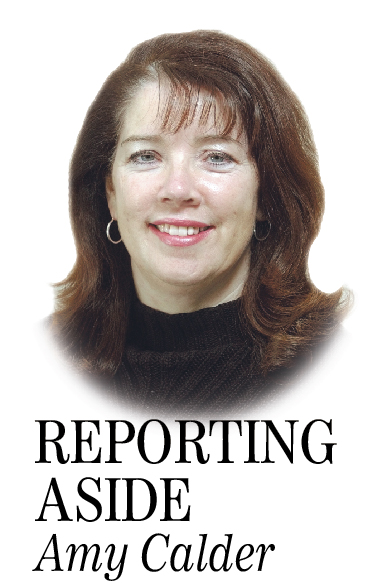FACES OF VETERANS I’ve known over the years have been swimming around in my head as the lilacs start to bloom, American flags are hung from porches and flowers are planted in cemeteries.
And while Memorial Day, May 30 this year, is a holiday to honor those who died while serving in the U.S. armed forces, I can’t help but remember all veterans now gone. For me, the holiday sort of merges with Veterans Day, which falls on Nov. 11 and honors veterans both living and dead.
There’s my father, who died in 2010 at 92. He was in the U.S. Navy in World War II, a signalman in the First Destroyer Escort Division, serving aboard the USS Bebus. In 1943, he served in the Southwest Pacific and was in the Battle of Okinawa.
He never talked a lot about being in the war, but his language throughout his lifetime was fraught with nautical terms and he was perhaps the best navigator I’ve ever known, both on water and land. He could tell when a storm was brewing, even if the skies were sunny, knew instinctively where it would come from, and could navigate by looking at the stars. Sometimes I can hear his voice in my head, particularly at certain times of the year, with a warning: “Never go anywhere near the water before Memorial Day.”
When I hear of spring swimming and boating accidents, I remember his words.
Then there’s my grandfather, Dad’s father, whom I never met as he died young at 53 because he contracted tuberculosis from having been mustard-gassed in World War I. Ross Calder was in the U.S. Army and I knew him only from family photographs, his wool military uniform and helmet that hung in our house when I was growing up, and stories of his fragile health. I also recall hearing a story about how my grandfather carried a fellow soldier — whose arms and legs had been blown off — in a sort of cloth sling, running.
The story fills me with sadness, not only for the soldier and his family, but also for my grandfather, who lived with that memory during his own lifetime, cut short because of war.
My late father-in-law, Franklin Norvish, served as a special agent in the Counter Intelligence Corps in World War II, storming Utah Beach in Normandy on D-Day and riding into Paris with Charles de Gaulle, having memorized the names of dozens of Nazi war criminals that he would later help capture. Assisted by free French units, he apprehended more than 40 collaborators, saboteurs, defectors and infiltrators. Of the many exploits in which he was involved, he was most proud of being instrumental in locating and shipping off to London six German nuclear scientists and their notes. Frank died at 98 six years ago.
There’s also Col. Albert Dionne, a former Skowhegan police chief, who served in the U.S. Marine Corps and then the Maine Army National Guard, earning more medals than anyone I can think of. My father admired Dionne, recalling how regal and professional he looked, sitting tall as he drove through town in his cruiser while serving as chief in the 50s. After he retired, he led Memorial Day parades in town. Dionne died at 82 in 2008. I remember him as well-spoken, gracious and handsome.
Other faces come to mind, including that of young Jay Thomas Aubin, a Marine captain and helicopter pilot who was only 36 when the helicopter he was in crashed on its way from Kuwait to Iraq on March 20, 2003. He had grown up in Skowhegan where his mother and mine worked together as registered nurses. While I don’t believe I ever met him, I mourned for his mother, as well as for his young wife and two children.
And just this month, Real Cyr of Winslow died at 91. A Quebec native, he enlisted in the Canadian army at 15 and completed basic training, but the army discovered he was underage and let him go. Undaunted, he later enlisted in the Royal Canadian Navy and served on a British corvette in the North Atlantic. He was in the submarine service off Norway in 1943 when the Germans captured his sub which had tried to sink a German battle cruiser. He and two other men escaped. Aided by the French underground, they dressed as nuns, hid in a convent and three days later were back with the Allies.
Cyr, with whom I had the privilege of speaking over the years, later served on the American submarine USS Croaker in the Pacific. Oh, the stories he could tell about his war days. Cyr’s obituary contains a quote from him that aptly sums up his war experience: “We fought hard; we played hard. We were glad to be alive.”
It’s people like Cyr, Aubin, Dionne, my father, grandfather and father-in-law who I will think about a lot over the next week, and on Memorial Day, I will say a prayer for all of them — including those I knew and did not know.
If not for them and their bravery and compassion, we’d not be able to enjoy the sun and warm breeze, the lilacs, music, parades and all the other sweet things that accompany the holiday, including the anticipation that comes with knowing summer is ahead.
It’s a gift that only they, and God, could give.
Amy Calder has been a Morning Sentinel reporter 28 years. Her column appears here Mondays. She may be reached at acalder@centralmaine.com. For previous Reporting Aside columns, go to centralmaine.com.
Send questions/comments to the editors.


